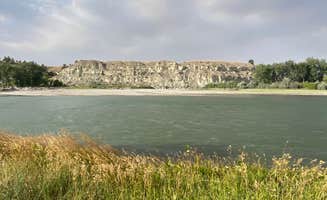Dispersed camping near Billings, Montana centers on public lands managed by the Bureau of Land Management, with most sites situated between 1,800-4,000 feet elevation. The region experiences hot, dry summers with temperatures frequently reaching 90°F, while spring and fall offer milder conditions for camping. Many primitive sites require advance preparation as seasonal restrictions often apply from June through September due to fire danger.
What to do
Fishing opportunities: Captain Clark offers direct access to the Yellowstone River with a boat ramp. "Great spot right next to the river. Has toilet and boat ramp. Shade is good. Not too many things to do around the area unless a boat is brought in, but great for quick one night camping," reports Robert B.
Wildlife viewing: The primitive sites around Acton Recreation Area provide excellent wildlife observation. "Heard some coyotes over night and saw some hunters in the morning," notes Jennifer. Wild turkeys are frequently spotted at Captain Clark, with one camper reporting they "were pretty vocal last evening."
Mountain biking: The trail system at Acton Recreation Area offers options for various skill levels. "This is one of my favorite local riding spots. The trails are well used and vary from flat and easy to moderately difficult. Lots of bicyclers on the trails," shares Kathi F.
What campers like
River access: The established sites at Captain Clark provide direct river frontage. "This spot is a hidden gem. If you like a view along the river where it's quiet even with other campers this is the spot! Some nice tall trees, but up against the river and some bluffs off on the other side of the river," reports Kirsten B.
Seclusion options: At Acton Recreation Area, campers can find privacy by traveling further into the area. "Loved this campsite. A bit out of the way from the highway but worth it. About 6 spots, the first 4 are huddled in a circle but we drove further down the rough road and found a secluded spot far from the others," explains Alyson M.
Historical significance: Captain Clark offers a connection to western exploration history. "Easy to imagine Capt. William Clark floating past in 1806 in his lashed together canoes on his way to the Missouri to rejoin Capt. Merriweather Lewis," notes Mike C.
What you should know
Permit requirements: Captain Clark now requires permits for overnight stays. "A Montana State Parks Conservation Permit is now required to camp here. Your permit is good all year," advises Mike C. The out-of-state permit costs $10 and covers multiple locations throughout the year.
Road conditions: Access roads to primitive camping areas often require appropriate vehicles. "The road right before getting to the park was washboard like. Can drive quite a ways down but make sure your vehicle has Clearance cause the dirt road gets rough," warns Darnell C. about Acton Recreation Area.
Insect activity: General Custer Fishing Access Road has significant mosquito issues during warm months. "The mosquitoes here are horrid as it's a marsh, we considered peeing in a jar in our van instead of risking opening the insect mesh," reports one camper.
Tips for camping with families
Kid-friendly sites: The main entrance area at Acton Recreation Area offers accessibility for families. "Was better and bigger then expected, camp up top the first 1-2 sections if not have a truck/high suspension for the dirt road further down. The bathroom near entrance so camp first section if need that daily for easy walk to it. Took my 3 kids and had a great time for 2 days," shares Dav.
Swimming options: Despite the Yellowstone River's generally fast current, safer water access exists at specific locations. "The Yellowstone River is a fast moving and dangerous river but there is a great swimming hole on the other side of the boat launch," notes Morgan B. about Captain Clark.
Educational opportunities: Cultural and historical sites complement camping trips in the area. "We backtracked the next morning to explore Pompey's Pillar National Monument," mentions Dorothy J. This national monument features the only remaining physical evidence of the Lewis and Clark Expedition.
Tips from RVers
Length restrictions: Captain Clark enforces vehicle limitations. "Length limit on vehicles is 20 feet. They clarify 20 ft tow vehicle and 20 ft trailer. Don't know how strict they are on this. It would be tough to get anything big in here anyway," cautions Mike C.
Smaller trailers welcome: Some areas accommodate modest towed units. "A small tow behind camper would fit in here," advises Luke H. about Captain Clark. At Acton Recreation Area, campers report successfully navigating with smaller trailers: "I checked out the first couple groups of sites with my Subaru Crosstrek pulling a square drop trailer without issue," notes Vincent B.
Site selection strategy: When arriving at primitive camping areas, strategic site selection helps avoid challenging terrain. "Camp up top the first 1-2 sections if not have a truck/high suspension for the dirt road further down," recommends Dav about Acton Recreation Area, which becomes increasingly rugged beyond the entrance area.



